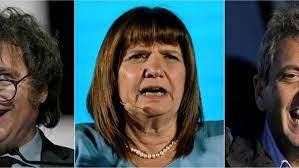
BUENOS AIRES, Oct 22, 2023 (BSS/AFP) - Argentines head to the polls on Sunday
in a presidential election dominated by fury over decades of economic decline
and record inflation that has propelled political outsider Javier Milei to
the front of the race.
Once one of the richest countries in the world, Argentina has stagnated in
recent decades, unable to escape cycles of fiscal crises marked by debt,
financial mismanagement, and inflation which now stands at 140 percent year-
on-year.
With 40 percent of the population living in poverty and a middle-class
brought to its knees, many voters are keen to see the back of the traditional
parties they see as the architects of their misery.
"It's total uncertainty -- you never know if your rent will go up, (or)
prices in the supermarket. It's madness," said university student Valentin
Figarra, 20. "One wants to grow... but this generation is falling behind,
it's sad."
Milei, a libertarian economist who formed his party Libertad Avanza (Freedom
Advances) only in 2021, blindsided most experts and pollsters when he surged
to the front of the election race, winning a primary with 30 percent of
votes.
The self-described "anarcho-capitalist" with disheveled hair and a rock-star
persona has lured voters with his diatribes on television and social media --
where he vows to "dynamite" the central bank and ditch the peso for the US
dollar.
He has run his campaign on TikTok and YouTube and showed up at live rallies
with an actual powered-up chainsaw vowing to slash public spending by 15
percent.
- 'Already broken' -
Political science student Agustin Baletti, 22, said he will be voting for
Milei because past governments have "left young people without hope."
"Everything is already broken. Milei isn't going to break anything."
While Milei has topped opinion polls, these have not proved reliable in the
past, and analysts say anything can happen between the three frontrunners out
of five total candidates.
Charismatic Economy Minister Sergio Massa represents the ruling center-left
Peronist coalition, a populist movement heavy on state intervention and
welfare programs that has dominated Argentine politics for decades but has
grown deeply unpopular.
Having overseen the country's recent economic pains, he has been an easy
punching bag for his rivals.
To woo voters, Massa has gone on a pre-election spending spree, slashing
income tax for much of the population in a move analysts say will only make
the country's fragile financial situation worse.
To counter Milei, his government has taken pains to explain to voters what a
loss of key subsidies that keep public transport and electricity, among
others, dirt cheap, will mean.
- 'Highly incompetent' -
The other frontrunner is the stern and tough-talking Patricia Bullrich, a
former security minister who has also vowed radical change from the
overspending, money-printing Peronists and their strict currency controls.
Bullrich served in the government of former president Mauricio Macri (2015-
2019), a pro-market, non-Peronist who failed in his promise to contain
spending and took out a record $44 billion loan with the International
Monetary Fund, which has bailed Argentina out 22 times despite several
massive defaults.
Irene Landa, 70, a psychoanalyst said she believes Bullrich is the "most
coherent" of the lot.
"Milei, to me, it would be like giving a revolver to a monkey," Landa said.
"But I think people are so fed up, so tired, that they believe in what he
says."
Voters are fed up with "politicians who have been highly corrupt, highly
incompetent, who have never paid attention to something we learn in high
school, that you shouldn't spend more than you earn," said Buenos Aires-based
economist Andres Borenstein.
Argentina's 35,8 million registered voters will be able to cast their ballots
from 8am local time (1100 GMT) to 6pm (2100 GMT).
Preliminary results are expected on Sunday evening.
To avoid a runoff election on November 19, a candidate needs to win 45
percent of the vote Sunday, or 40 percent with a difference of 10 points or
more over the nearest rival.